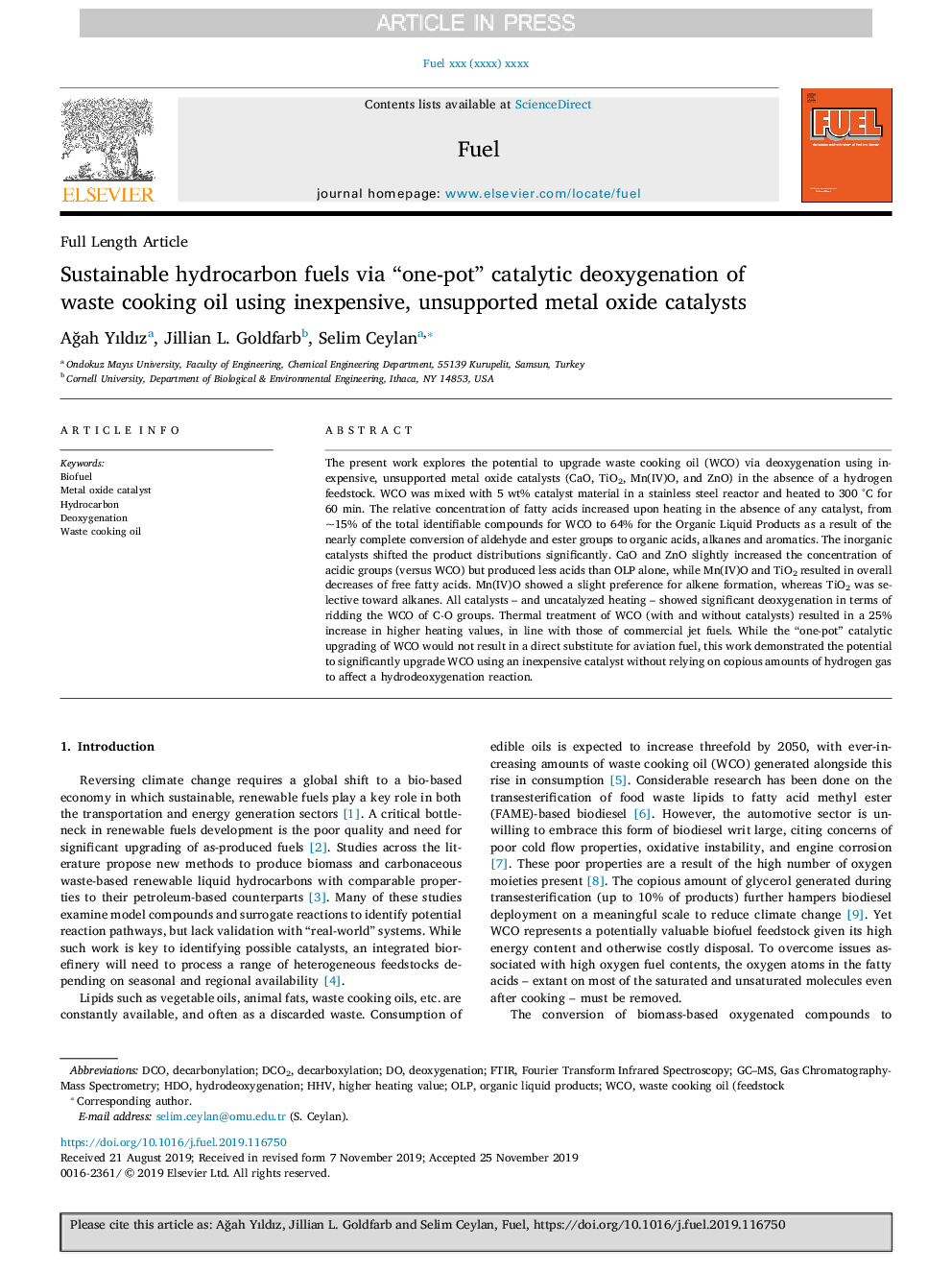| کد مقاله | کد نشریه | سال انتشار | مقاله انگلیسی | نسخه تمام متن |
|---|---|---|---|---|
| 13416196 | 1841309 | 2020 | 7 صفحه PDF | دانلود رایگان |
عنوان انگلیسی مقاله ISI
Sustainable hydrocarbon fuels via “one-pot” catalytic deoxygenation of waste cooking oil using inexpensive, unsupported metal oxide catalysts
دانلود مقاله + سفارش ترجمه
دانلود مقاله ISI انگلیسی
رایگان برای ایرانیان
کلمات کلیدی
WCODCO2DCOHHVDecarbonylationHDOOLPGC–MS - GC-MSDeoxygenation - اکسید شدنDecarboxylation - دککاربوکسیلات کردنWaste cooking oil - روغن پخت و پز زبالهBiofuel - سوخت های زیستیFTIR - طیف سنج مادون قرمزFourier transform infrared spectroscopy - طیف سنجی مادون قرمز تبدیل فوریه یا طیف سنجی FTIRHydrodeoxygenation - هیدروژن اکسید شدنhydrocarbon - هیدروکربنMetal oxide catalyst - کاتالیزور اکسید فلزیGas Chromatography-Mass Spectrometry - گاز کروماتوگرافی-اسپکترومتری جرمیHigher heating value - گرمای بالاتر
موضوعات مرتبط
مهندسی و علوم پایه
مهندسی شیمی
مهندسی شیمی (عمومی)
پیش نمایش صفحه اول مقاله

چکیده انگلیسی
The present work explores the potential to upgrade waste cooking oil (WCO) via deoxygenation using inexpensive, unsupported metal oxide catalysts (CaO, TiO2, Mn(IV)O, and ZnO) in the absence of a hydrogen feedstock. WCO was mixed with 5 wt% catalyst material in a stainless steel reactor and heated to 300 °C for 60 min. The relative concentration of fatty acids increased upon heating in the absence of any catalyst, from ~15% of the total identifiable compounds for WCO to 64% for the Organic Liquid Products as a result of the nearly complete conversion of aldehyde and ester groups to organic acids, alkanes and aromatics. The inorganic catalysts shifted the product distributions significantly. CaO and ZnO slightly increased the concentration of acidic groups (versus WCO) but produced less acids than OLP alone, while Mn(IV)O and TiO2 resulted in overall decreases of free fatty acids. Mn(IV)O showed a slight preference for alkene formation, whereas TiO2 was selective toward alkanes. All catalysts - and uncatalyzed heating - showed significant deoxygenation in terms of ridding the WCO of C-O groups. Thermal treatment of WCO (with and without catalysts) resulted in a 25% increase in higher heating values, in line with those of commercial jet fuels. While the “one-pot” catalytic upgrading of WCO would not result in a direct substitute for aviation fuel, this work demonstrated the potential to significantly upgrade WCO using an inexpensive catalyst without relying on copious amounts of hydrogen gas to affect a hydrodeoxygenation reaction.
ناشر
Database: Elsevier - ScienceDirect (ساینس دایرکت)
Journal: Fuel - Volume 263, 1 March 2020, 116750
Journal: Fuel - Volume 263, 1 March 2020, 116750
نویسندگان
AÄah Yıldız, Jillian L. Goldfarb, Selim Ceylan,